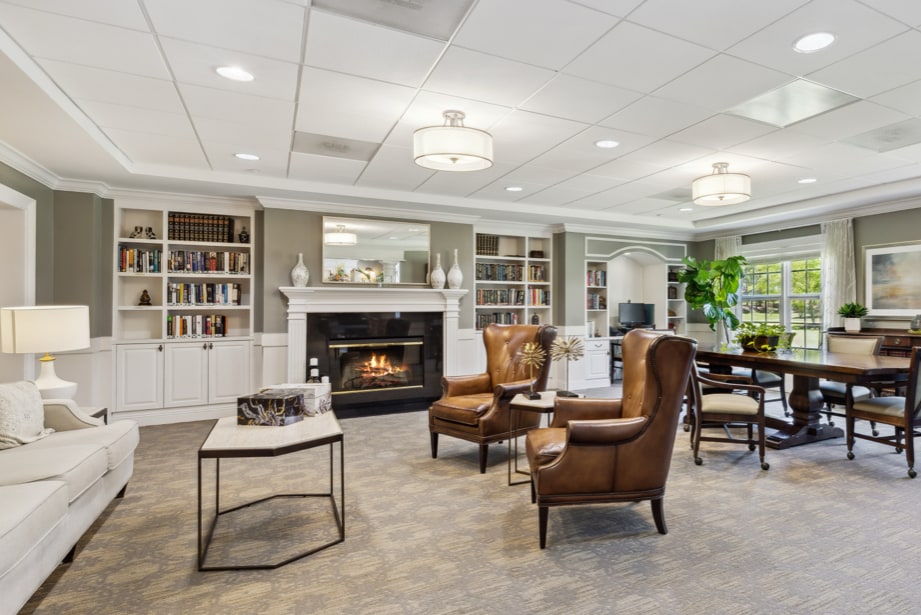Memory care communities are becoming increasingly important as the aging population grows. These communities offer specialized care services, catering to those living with memory impairments, such as Alzheimer’s disease and other forms of dementia. A few things you can expect from a memory care facility include:
- Tailored services and amenities
- Increased safety and security measures
- Specialized care services, including assistance with daily activities
- A supportive environment for mental and physical well-being
Understanding what to expect from a memory care community can help families make informed decisions and ensure their loved ones receive the care they need. But understanding what to expect and choosing the right community isn’t the same thing, so we’ve also included tips for narrowing down your search and making the transition into a new senior living lifestyle smooth.
What Is a Memory Care Community
Memory care communities are specialized residential settings designed to provide structured and supportive environments for individuals with memory impairments. Unlike other senior living options, memory care focuses specifically on the needs of residents with memory loss, offering tailored services, amenities, and specialized care.
- Daily routines: These communities offer structured routines designed to provide stability and familiarity for residents. These include scheduled meals, activities, and rest times. These communities also provide assistance with daily activities such as bathing, dressing, and medication management.
- Engaging activities: Residents can participate in group activities, outings, and social events tailored to their interests and abilities, taking into account varying levels of cognitive and physical ability.
- Supportive environment: Memory care communities provide an atmosphere that fosters social interaction and emotional support among residents so they can retain as much autonomy as possible.
- Safety and security: Memory care communities typically offer secure and navigable living spaces to prevent residents from wandering. Many communities also have color-coded hallways for easy navigation.
Choosing the Right Memory Care Community
Selecting the right memory care community is a crucial decision that requires careful consideration. While many communities offer similar services that meet the core needs of most individuals with dementia, each community will also have unique features.
Families should start by researching and visiting multiple communities to understand the environment, staff, and services offered. Here are some key factors to consider when choosing a memory care community:
- Safety and security: Ensure that the community has robust safety measures in place, such as secured entrances and exits, emergency response systems, and trained staff.
- Staff training and qualifications: Inquire about the caregivers’ and staff’s training and qualifications. Look for communities with a low staff-to-resident ratio so you can rest assured that your loved one receives the care and attention they need.
- Personalized care plans: When considering various communities, choose one that offers individualized care plans tailored to the resident’s specific needs and preferences. This ensures that your loved one receives the appropriate level of care and support and gets the opportunity to retain as much autonomy as possible.
- Activities and engagement: Evaluate the variety and quality of activities and programs. A good memory care community will provide various activities catering to different interests and abilities, promoting engagement and socialization.
- Family involvement: Consider how the community involves and supports family members. Look for communities that encourage family visits, offer regular updates on the resident’s progress, and provide resources for family members.
Transitioning into Memory Care
Transitioning to a memory care community can be challenging for the resident and their family. Here are some tips to help make the process smoother:
- Plan ahead: Start the search for a memory care community early, before the need becomes urgent. This allows ample time for research and decision-making and reduces the need for quick decisions.
- Communicate openly: Keep open lines of communication with your loved one and the other family members involved throughout the process. Involve your loved one in decisions as much as possible to ensure they feel heard and respected because this transition potentially impacts their life the most.
- Ease the transition: Gradually introduce your loved one to the new community. Arrange visits and familiarize them with the environment and staff before the move. Personalize their living space with familiar items to create a sense of home.
Discuss Memory Care Needs with Our Team
Memory care communities play a vital role in providing specialized care and support for individuals with memory impairments. Their expertise and dedication can provide you with the reassurance and confidence you need during the decision-making process.
Further research and consultations with memory care professionals can provide additional guidance and support for those looking to learn more and take the next step. Contact us today at Somerby Mobile. Our experienced and compassionate team can answer your questions about life in a memory care community.









